Understanding Quaker Parrots: Traits and Care
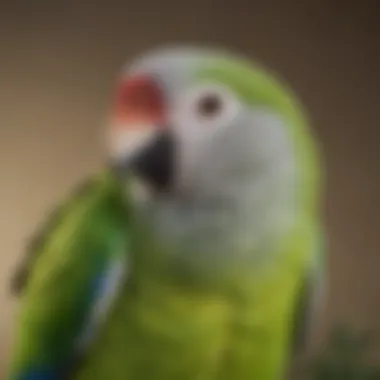
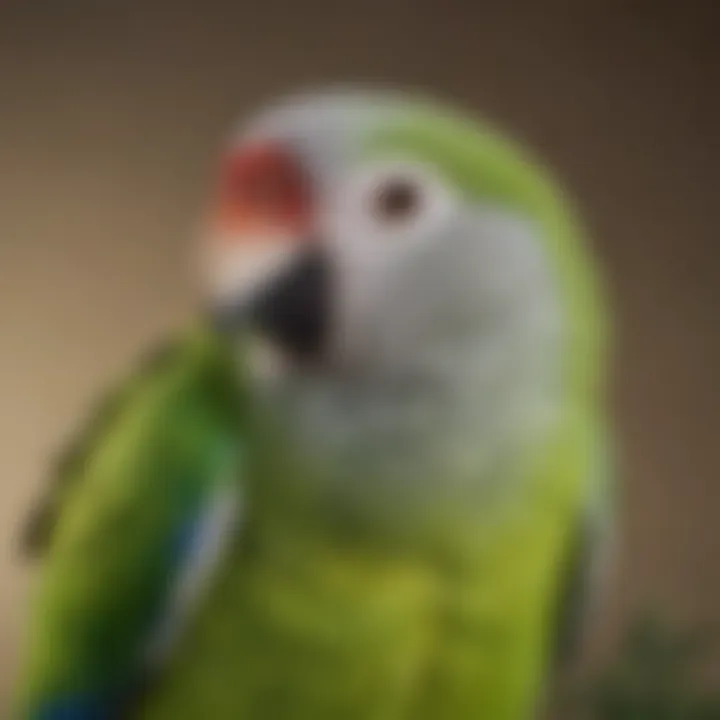
Intro
Quaker parrots, or Monk parakeets, are captivating little birds known for their vibrant personalities and social nature. Their charm lies not just in their colorful feathers, but equally in their playful demeanor and vocal abilities. Owning a Quaker parrot is like inviting a tiny whirlwind of energy and intelligence into your home. However, as with any pet, proper understanding of their unique traits and requirements is crucial for a harmonious relationship.
In exploring the world of Quaker parrots, one will uncover key elements that range from their lively social behaviors to their specific dietary and environmental needs. Understanding these factors not only increases the well-being of the bird but also enhances the joy of having these cheerful companions in daily life.
With that in mind, let's dive into the Avian Care Basics, ensuring every aspect of Quaker parrot care is addressed to foster a nurturing environment.
Preamble to Quaker Parrots
Understanding Quaker parrots is not just an academic endeavor; it's crucial for anyone looking to care for these delightful creatures. Their rich history and distinct personality traits make them unique in the avian community. This section sets the stage for appreciating the needs and characteristics of Quaker parrots, which will ultimately help caregivers provide the best environment for them. A bird isn’t just a pet; it’s a companion, and knowing the background of the species can enhance the relationship you build over time.
Origins and History
Quaker parrots, also called Monk parakeets, have roots that stretch back to South America. These birds were first discovered in the wild in the late 1800s, in regions such as Argentina and Uruguay. They were notable for their social nature, often found in large, cohesive flocks. Their adaptability to urban environments has been a game changer; these birds learned to thrive in cities and towns, making them a common sight in various parts of the world.
In the early 20th century, Quaker parrots began to be exported to the United States and Europe. Interestingly, their popularity soared, not just for their vibrant colors and social disposition, but also due to their ability to mimic sounds and phrases. Eventually, they became a staple in households across North America. What's more, you’d find that these birds were not just pets but companions capable of forming strong bonds with their owners. This history helps establish why they are cherished pets today, making their understanding more relevant to potential bird parents.
Understanding Their Name
The name "Quaker parrot" stems from their somewhat quaky appearance and behavior. The term "Monk parakeet" emphasizes their tendency to form communal nests. It’s an interesting juxtaposition; while they might have a name inspired by their quirky demeanor, they have established a reputation for social intelligence and adaptability. Their communal nesting behavior doesn’t just illustrate their social nature; it provides insight into how they flourish when kept in pairs or small groups. Keeping these birds in social settings allows their natural traits to shine and leads to a healthier, happier life.
"Knowing the origins and the meanings behind the names of Quaker parrots deepens the appreciation for these intelligent birds and highlights the importance of socialization in their care."
In summary, as we delve into various aspects of Quaker parrots throughout this article, understanding their origins and the story behind their name lays the groundwork for ideal care practices. Recognizing their historical significance and social needs will be particularly helpful to prospective bird owners in fostering a supportive and engaging environment.
Physical Characteristics
Understanding the physical characteristics of Quaker parrots is crucial for several reasons, particularly for their owners and those who wish to adopt them. These birds are not just visually appealing; their shape, size, and color reflect their personality and health. Knowing what to expect helps in identifying any irregularities that could signify health problems. Furthermore, recognizing their traits allows caregivers to create an optimal environment and lifestyle tailored to their needs.
Size and Weight
Quaker parrots typically weigh between 70 to 120 grams and measure about 23 centimeters in length. Their size makes them suitable for various living environments—be it a cozy apartment or a larger home. However, because of their compact stature, it is easy to underestimate their strength and agility. Despite being small, they have an impressively powerful beak, which can be used for cracking nuts, and a body built for agility. Owners should monitor their weight consistently as fluctuations can indicate health issues or poor diet. A heavier bird may be a sign of obesity, while a very light one could signal illness.
Color Variations
Quaker parrots are famous for their vibrant feather colors. The most common is the bright green, which is often complemented with gray and blue undertones. However, their palette isn't limited. Breeders have cultivated various color mutations, including blue, yellow, and lutino. Each of these variations has its charm and allure, flattering different preferences among avian enthusiasts. It's essential for bird owners to understand the specifics of their quaker's color type since some color variations may be more prone to specific health concerns. For instance, certain blues might have weaker immune systems. Many owners find the blue Quaker particularly appealing and often seek them out.
Distinctive Features
Among the various physical characteristics, Quaker parrots exhibit several distinctive traits that set them apart from other bird species. Their strong, curved beaks are highly adaptable for various diets. Moreover, they boast a plumage that slightly lifts around the neck, giving them a unique silhouette. Another defining trait is their relatively short tails; while not as pronounced as those of some other parrot species, it complements their rounded body effectively.
Having a thorough understanding of these distinctive features enhances an owner's ability to identify potential health problems, as any sudden changes in their physical appearance could indicate stress or illness. Additionally, knowing these traits can help foster better interactions between the owner and the bird, allowing for a stronger bond.
Understanding the physical traits of Quaker parrots helps owners provide the best care and create an environment that suits their needs.
Behavioral Traits
Understanding the behavioral traits of Quaker parrots is crucial not only for their well-being but also for forging a strong bond with them. These traits provide insights into their inherent nature as social creatures, their methods of communication, and their innate curiosity. Grasping these behavioral aspects can significantly enhance the quality of care provided, making sure that these lively birds thrive in a home environment. Moreover, recognizing and responding to their behavior can alleviate potential issues that may arise from misunderstandings between the pet and the owner. Here, we delve into the unique qualities that define Quaker parrots, which includes a focus on their social interactions, vocalizations, and playful spirit.
Social Interactions
Quaker parrots are nothing short of social butterflies in the avian world. They are well-known for forming strong bonds, not only with their human caretakers but also with other birds. Their social nature means that they can become attached to companionship, necessitating a careful approach to their interactions.
These birds communicate affection through various body language cues. For example, when a Quaker keeps its feathers smooth and puffs its chest out, this behavior indicates contentment and a desire for interaction. Engaging in regular play sessions and establishing routines can further solidify trust and companionship. It’s beneficial to also incorporate other birds, especially if they are similar in size or personality, as Quaker parrots often benefit from the company of their kind.
Furthermore, training sessions that involve social interaction can greatly enhance mutual understanding and strengthen the bond shared with these birds. Consider this when arranging their playtime; the more social engagement, the better for their overall happiness.
Vocalizations and Communication
Vocalizations are a pivotal aspect of how Quaker parrots interact with their environment and those around them. They're particularly chatty and are known for their ability to mimic sounds and human speech. Listening closely can reveal a lot about their emotional state. A loud squawk may signify excitement, while a softer chirp might indicate contentment or calmness. Understanding these vocalizations fosters a deeper relationship with your Quaker parrot.
Some Quakers can be true chatterboxes, surprising owners with their mimicry skills. To encourage this, owners should engage them with playful talking, repeating phrases, or sounds. Each bird has individual preferences; while one might mimic a ringing phone, another may prefer to mimic laughter or a song.
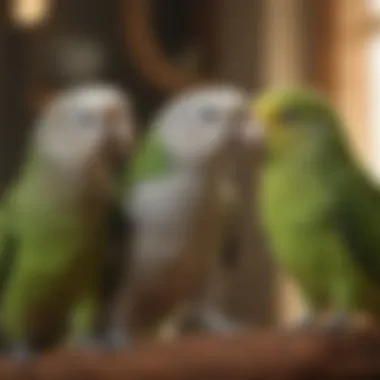
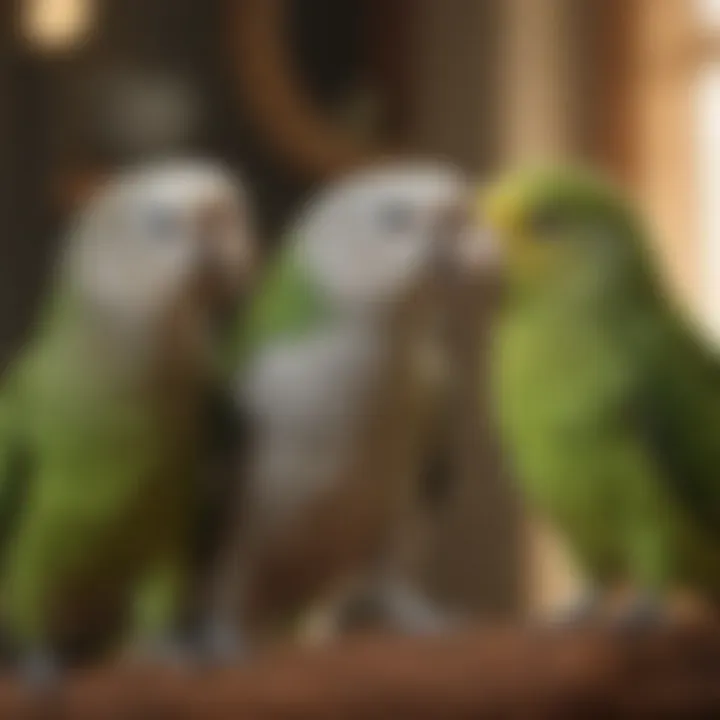
Important: Regular interaction is vital for fostering their vocal skills; otherwise, they may become bored and resort to undesirable behaviors.
Playfulness and Exploration
Playfulness runs through the veins of Quaker parrots. Their naturally curious disposition drives them to investigate their surroundings. Providing stimulating toys and opportunities for exploration can prevent boredom, which can lead to stress or behavioral issues. Toys that offer challenges or require manipulation—like puzzle feeders or foraging toys—are particularly stimulating and can keep these intelligent birds occupied for hours.
It’s also essential to create safe spaces for them to explore. This could include perches at various heights and non-toxic climbing structures. Quakers love to move around; giving them access to safe play areas in a bird-proofed room allows for exercise and engagement. When these birds feel free to explore, they demonstrate their unique personalities and instincts, enriching the bond shared with their caregiver.
Encouraging playtime enhances their learning curve and instills a sense of achievement which is valuable for their emotional development.
In summary, recognizing and nurturing the distinct behavioral traits of Quaker parrots fosters a fulfilling relationship for both the bird and the owner. Understanding their need for social interaction, recognizing their vocal expressions, and providing ample play opportunities are central pillars that ensure a happy, healthy Quaker in your household.
Dietary Needs
Understanding a Quaker parrot's dietary needs is not just a matter of feeding them; it’s about promoting their overall health and well-being. These vibrant birds thrive on a balanced diet that mirrors their natural foraging behaviors. The right nutrition can prevent health issues, enhance their lively social interactions, and boost their overall emotional stability. As highlighted in various studies, a nutritionally rich diet positively impacts both feather quality and longevity.
Essential Nutrients
A well-rounded diet for Quaker parrots should include essential nutrients that cater to their specific physiological requirements. The fundamental components include:
- Proteins: Vital for muscle development and repair. Look for high-quality sources like cooked legumes, eggs, or specific nuts.
- Carbohydrates: Provide energy. Whole grains like oats, quinoa, and whole-wheat bread are beneficial.
- Fats: Essential for skin and feather health. Include small amounts of seeds like hemp or flax, which are rich in omega fatty acids.
- Vitamins and Minerals: Vitamins like A, D, E, and K, along with calcium and phosphorus, support various bodily functions. Green leafy veggies and certain fruits can help meet these needs. A good key point to remember is "You are what you eat”; the same rings true for your parrot.
Recommended Foods
Feeding your Quaker parrot a variety of foods is a cornerstone of care. This includes fresh fruits and vegetables, seeds, and pellets. Here’s a concise list of recommended options:
- Fresh Vegetables: Leafy greens such as kale, spinach, and romaine are excellent choices. Peppers, carrots, and broccoli also add variety.
- Fruits: Apples (with seeds removed), bananas, berries, and papaya can be delightful treats. Just limit high-sugar fruits.
- High-Quality Pellets: Look for brands explicitly designed for small parrots, ensuring balanced nutrition.
- Seeds & Nuts: Provide them in moderation, focusing on sunflower seeds and walnuts. No more than ten percent of their daily intake should come from these.
A diverse diet keeps Quaker parrots stimulated and promotes their health.
Foods to Avoid
While it’s essential to provide a rich diet, certain foods can be harmful to Quaker parrots. Awareness of these avoids unintended health issues. Here’s what to steer clear of:
- Avocado: Highly toxic to many bird species.
- Caffeine: Found in coffee and tea, this substance can severely disrupt their heart and nervous system.
- Alcohol: Even a tiny amount can be dangerous.
- Chocolate and Sugar: Both can lead to health complications like obesity and heart disease.
- Processed Foods: These often have additives and preservatives that are detrimental to parrots’ health.
An attentive approach to your Quaker parrot’s diet translates into healthier, happier birds. Always consult with a veterinarian for personalized dietary recommendations, especially if your bird displays unusual behavior.
Housing and Environment
The environment in which your Quaker parrot resides speaks volumes about their overall health and happiness. A well-structured habitat does more than just provide shelter; it nurtures their natural instincts and fosters their sociability. When considering the housing and environment for your Quaker parrot, focus on creating a space that is safe, stimulating, and spacious enough to allow for normal behaviors.
Cage Requirements
A sturdy cage is essential for safety and well-being of your Quaker parrot. The dimensions should cater to their active nature; ideally, you should opt for a cage that is at least 24 inches wide, 24 inches deep, and 30 inches high. Bars should be spaced no more than half an inch apart to prevent accidental escapes. Quaker parrots are adept at climbing, so vertical space should not be neglected—think multi-level cages to provide them with various perches.
It is also wise to periodically check the materials of the cage. Avoid cages made from lead or zinc, as exposure to these substances can lead to health issues. Also, make sure the design allows for easy cleaning; a clean cage means a healthy bird. Some owners prefer to add a natural wooden perch, since it closely mimics their wild habitat, allowing them to grip with comfort and promotes foot health.
Safe Play Areas
Quaker parrots are notorious for their playful demeanor, so providing safe play areas is non-negotiable. These areas can be found both inside and outside the cage. Consider designated perches or play gyms equipped with multiple toys, shapes, and textures. Design the space to be free of hazards like loose wires or any toxic plants, which could pose danger.
A good trick is to rotate toys regularly; that way, your Quaker stays entertained and mentally stimulated. For out-of-cage time, a secure room free of open windows or potential escape routes will save you a good deal of worry. Quaker parrots love to hang out on shoulders, but it's best to create an area specifically for them to forage, explore, and let their curious nature roam freely.
Environmental Enrichment
Birds, like humans, require mental stimulation. It's essential to enrich their environment with an assortment of activities that pique their interests. Integrate items that mimic their wild foraging instincts such as shredded paper or hidden treats in chewable boxes. Interactive toys that they can dismantle or manipulate help to keep their minds sharp and alert.
Consider these effective methods for enrichment:
- Foraging Opportunities: Hide treats in various corners of the cage to encourage natural foraging behaviors.
- Social Interactions: Similar to humans, Quakers thrive on social engagement. Incorporate family interaction into their daily routines, even if that means just chatting with them while cooking.
- Sound and Visual Stimulation: Provide toys or items that create sound—be it bells or rustling materials—while changing up their surroundings with colorful fixtures. It's crucial not to bombard them with stimuli at once; instead, slowly integrate new elements.
"A bored bird is a recipe for trouble. Keep their minds busy, and their bodies will follow suit!"


Balancing out structure with playfulness, safety with stimulation, and nurturing their instincts while providing oversight, lays the foundation of a thriving environment for your Quaker parrot. By carefully considering their housing and environment, you not only invest in their immediate well-being but also forge a deeper bond built on trust and understanding.
Socialization and Training
Understanding the socialization and training of Quaker parrots is crucial for any bird owner who wants a well-rounded companion. These parrots are highly social creatures, known for their lively personalities and strong bonds with their human caregivers. A well-socialized Quaker is less likely to exhibit behavioral issues and more likely to thrive in a home environment. Training not only fosters a deeper relationship but also instills structure, enabling the bird to express its natural instincts in a safe and productive way.
Building Trust with Your Quaker
Creating trust with a Quaker parrot starts with patience and consistency. It's essential to allow them to become acquainted with their new surroundings at their own pace. Spend quiet time near their cage, talking softly or reading aloud. Rather than rushing the process, let your Quaker come to you when they're ready. When they begin to approach or show signs of comfort, reward them with a treat. This builds positive associations, reinforcing that you are a source of safety and affection.
Keep in mind that each bird has its own unique personality. Some may be outgoing from the get-go, while others take longer to warm up. Don't be disheartened if progress appears slow. Understanding these nuances is key to forming a solid bond.
Basic Training Techniques
Training your Quaker parrot can be both enjoyable and beneficial. To start with, teaching simple commands like "step up" or "come here" can be a great way to establish communication. Here are some effective methods:
- Repetition: Birds learn through consistent routines. Use the same phrase or gesture every time you want them to respond.
- Positive Reinforcement: Offer treats immediately when they perform the desired behavior. This creates a strong link between the command and the action.
- Short Sessions: Keep training sessions brief, around 5-10 minutes, to prevent your bird from losing interest.
- Patience Is Key: Like people, every bird learns at its own pace. Celebrate the small wins; even just getting your parrot to step onto your finger is an achievement.
Addressing Behavioral Issues
Despite a loving environment, behavioral issues can still crop up. Recognizing the signs of distress or undesirable behaviors is the first step in addressing them. Common issues may include biting, excessive screaming, or feather plucking. Here are some strategies:
- Identify Triggers: Pay attention to what prompts the behavior. Is it lack of attention, boredom, or environmental stressors? Identifying these triggers is critical.
- Redirect Behavior: Instead of punishing, try redirecting their energy. Provide toys for stimulation or engage them in different activities when they exhibit negative behaviors.
- Consult Resources or Experts: There are numerous resources available online or in books that cover behavioral concerns in depth. If problems persist, consulting an avian trainer or vet can provide tailored advice.
"A well-behaved bird is not just a joy to own; it fosters a bond that can last a lifetime."
Overall, successful socialization and training make a world of difference in the life of a Quaker parrot. With a little dedication and understanding, both you and your feathered friend can enjoy a fulfilling relationship.
Common Health Concerns
Understanding the health concerns of Quaker parrots is crucial for any pet owner or aspiring bird parent. These charming creatures, with their playful antics and vibrant personalities, require attentive care to maintain their well-being. As intelligent beings, they can suffer from a range of health issues, and being informed about these can save both you and your feathered friend a future of troubles. The goal is to foster a healthy and happy environment, thereby enhancing the overall bond with your parrot.
Signs of Illness
Even the most attentive bird owners can sometimes miss subtle signs of illness. Quaker parrots are known for their resilience, but there are specific indicators that can signal a problem. A change in behavior is often the first red flag. If your parrot becomes more withdrawn or stops playing as usual, it might be time to scrutinize their health. Other signs to look out for include:
- Changes in appetite: Eating less or more than usual can indicate issues.
- Fluffed feathers: This could indicate that the bird is feeling unwell or cold.
- Lethargy: If your parrot is less active than normal, it's a cause for concern.
- Unusual droppings: Changes in color, consistency, or frequency of droppings can signal health problems.
- Coughing or sneezing: Respiratory issues may present with these symptoms.
Being proactive in recognizing these signs allows for quicker action, which is often key in treating ailments effectively.
"An ounce of prevention is worth a pound of cure."
Preventive Care
Preventive care serves as the backbone of a long, healthy life for your Quaker parrot. Establishing a routine that covers a spectrum of fundamental requirements can help avoid illness and maintain overall wellness. Here are some essential preventive care steps:
- Healthy Diet: Providing a balanced diet rich in fruits, vegetables, seeds, and pellets ensures your parrot receives vital nutrients.
- Social Interaction: Regular bonding activities keep your Quaker emotionally stable and happy, reducing stress-related health issues.
- Regular Exercise: Encouraging flight and playtime isn’t just fun; it helps prevent obesity and associated problems.
- Hygiene: Regularly cleaning the cage and toys reduces the risk of infections or bacterial growth.
- Environmental Monitoring: Keeping an eye on the humidity and temperature of their habitat can prevent respiratory issues and infections.
These measures help create a foundation for a healthy life, but they require diligence and consistency from the owner.
Veterinary Visits
Beyond daily care routines and preventive measures, regular veterinary visits are imperative to ensuring your Quaker parrot remains in optimal health. Bird-specific veterinarians are best suited for advising on the unique needs of parrots, and here's why timely visits are essential:
- Routine Health Checks: These checks help detect early signs of health issues that could spiral if left untreated.
- Vaccinations: Some vaccines may be recommended for specific diseases prevalent in avian populations.
- Blood Tests: These tests can catch internal problems that may not be apparent visibly, like infections or nutritional deficiencies.
- Nail and Beak Trims: Routine grooming helps maintain physical health and comfort for your bird.
- Expert Advice: Regular visits open opportunities for guidance on best practices for nutrition and environmental care.
In the long run, investing time and resources into veterinary care keeps those feathered companions chirping happily and energetically.
Understanding Their Emotions
Understanding the emotional landscape of Quaker parrots is crucial for anyone who wishes to care for these intelligent birds. Emotions in animals, just like in humans, play a significant role in behavior and overall well-being. When we comprehend how a Quaker parrot feels, we can tailor our care to better meet its needs, ultimately fostering a stronger bond. The emotional health of a Quaker translates not only into a happier bird but also into a more harmonious living environment for both the pet and its caregiver.
Bonding with Your Bird
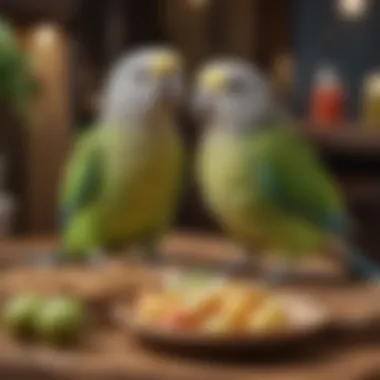
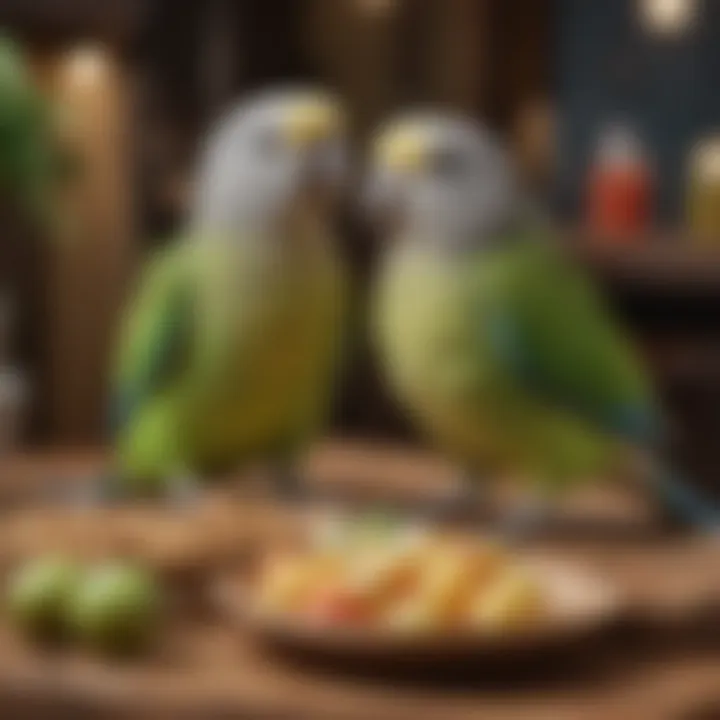
Establishing a solid bond with a Quaker parrot can be an immensely rewarding experience. These birds are naturally social and, when treated with respect and care, they can develop deep connections with their caregivers. To facilitate this bonding process, consider the following strategies:
- Spend Time Together: Dedicate time each day to interact with your Quaker. Talking softly, playing, or simply sharing space can build trust.
- Consistent Environment: A routine that includes feeding, playtime, and training where the bird feels secure can enhance bonding.
- Positive Reinforcement: Rewarding good behavior with treats or praise helps reinforce a trusting relationship. Offer the bird its favorite snacks when it approaches you or interacts positively.
When a parrot feels loved and secure, it is more likely to exhibit affectionate behaviors, such as preening or snuggling.
Recognizing Stress Signals
Just like any other pet, Quaker parrots can experience stress, and it’s essential for owners to recognize the signs.
Some common indicators of stress include:
- Feather Plucking: This is a clear sign of anxiety or boredom.
- Excessive Vocalization: While they are naturally chatty, sudden increases in noisy behavior could suggest distress.
- Changes in Eating Habits: If your bird suddenly stops eating or begins overeating, it may be experiencing anxiety.
- Aggressive Behavior: A normally docile Quaker acting out could be trying to communicate discomfort.
Understanding these signs is half the battle. Once recognized, steps can be taken to mitigate stress. Providing a calm environment and engaging in interactive play can help alleviate their worries.
Enhancing Their Emotional Well-Being
To keep a Quaker parrot emotionally satisfied, it’s important to proactively nurture their emotional health. Here are effective strategies for enhancing their well-being:
- Varied Activities: Filling their day with diverse activities, such as perches at different heights, swing toys, and foraging opportunities, can stimulate both their mind and body.
- Social Interaction: Quaker parrots thrive on socialization. Encourage playdates with other birds or allow them supervised time outside their cages to explore and interact with family members.
- Quality Nutrition: A balanced diet not only promotes physical health but affects mood too. Ensure a diet rich in fruits, vegetables, and high-quality pellets.
- Safe Spaces: Create areas in your home where the bird can retreat to feel safe when it needs alone time.
Ultimately, enhancing their emotional well-being means observing, understanding, and responding to their needs, which will foster a loving and fruitful relationship.
"Understanding your Quaker's feelings can transform your home into a haven of happiness for both you and your feathered friend."
Equipping yourself with knowledge on emotion can lead to a more fulfilling life with your Quaker parrot. By focusing on bonding, recognizing stress signals, and ensuring their emotional health, you'll contribute significantly to their overall happiness and longevity.
Caring for Quaker Parrots: An Overview
Caring for Quaker parrots involves understanding their unique needs and ensuring their well-being. These birds are not just pets; they are lively companions with distinct personalities. The depth of care you give them directly influences their overall health and happiness. Whether you’re a new bird parent or an experienced keeper, a comprehensive grasp of their daily requirements, long-term care, and community involvement is essential.
Daily Care Routines
A structured daily care routine plays an integral role in the lives of Quaker parrots. It helps establish a sense of security and predictability.
- Feeding: Provide a balanced diet daily, rich in fresh fruits, vegetables, and high-quality pellets. Aim to offer these in the morning, when they are most energetic.
- Social Interaction: Spend significant time with your birds. Quakers thrive on social engagement. Their intelligent nature craves mental stimulation, so talking, singing, or even playing with them should be part of the routine.
- Clean Environment: Daily cleaning is crucial to prevent buildup of waste and bacteria. Remove uneaten food, and refresh their water to keep them hydrated.
- Exercise: Allow for ample out-of-cage time. These birds love to fly and explore their environment. If bird-proofing the room is done wisely, they can have a safe area to stretch their wings.
Long-Term Care Considerations
Planning for long-term care is critical. Quaker parrots can live for over 20 years, making that commitment just as serious as adopting a dog or cat.
- Regular Vet Visits: Routine veterinary check-ups are necessary. Avian veterinarians understand specific needs related to these birds and can provide tailored advice based on their health history.
- Diet Evolution: As your bird ages, their diet might need adjusting. Pay attention to any changes in preferences or health issues that may arise during their golden years - it’s all part of nurturing their well-being.
- Social Needs: Understand that Quakers are social by nature. If a household has multiple pets or children, ensuring they are part of family activities can be just as vital.
- Enrichment: Regularly introduce new toys or activities to keep their environment stimulating. Just as a child seeks new experiences, your bird will appreciate the variety in playtime.
Creating a Supportive Community
Being a bird owner is not just about providing food and shelter; it's about fostering a community that understands and supports the needs of these vibrant creatures.
- Networking with Other Owners: Joining local or online groups, such as those found on Reddit or Facebook, can offer invaluable insights. Sharing experiences enhances knowledge and creates bonds among bird enthusiasts.
- Educational Resources: Engage with articles and studies published on platforms like Wikipedia or Britannica. These resources can aid in understanding the latest best practices in Quaker care.
- Community Events: Participate in bird fairs or adoption events. These gatherings are not only learning opportunities but also chances to connect with fellow bird lovers who can share advice and experiences.
It's crucial to remember that Quaker parrots are not merely pets; they are beings with individual personalities that need care, love, and companionship.
Ending
Understanding the unique traits and specialized care of Quaker parrots is not just an academic exercise but a crucial aspect of responsible pet ownership. These birds are not only intelligent and social creatures, but their well-being is directly tied to the attention and care they receive from their caregivers. As we have explored throughout the article, Quaker parrots exhibit distinctive behavioral patterns, nutritional requirements, and emotional needs that must be met to ensure a fulfilling life.
Recap of Key Points
To summarize, here are some pivotal elements we've discussed:
- Physical Characteristics: Quaker parrots are medium-sized with striking colors and distinguishable features, making them visually appealing companions.
- Behavioral Traits: Their social nature means they thrive in close relationships, whether with humans or other birds, requiring regular interaction.
- Dietary Needs: A balanced diet rich in fruits, vegetables, seeds, and pellets is essential for maintaining their health.
- Housing and Environment: Proper housing and enrichment activities are vital for their mental and physical stimulation.
- Socialization and Training: Establishing trust and using positive reinforcement are key to training these intelligent birds.
- Health Concerns: Awareness of common health issues and regular veterinary check-ups can prevent many problems.
- Emotional Well-Being: Recognizing stress signals is essential, as Quaker parrots are sensitive creatures that require emotional support.
- Daily Care: Consistent routines not only create a sense of security but are fundamental in their overall care.
By comprehending these facets, bird owners can create a nurturing environment that significantly improves the quality of life for their Quaker parrots.
Encouragement for Future Care
As you embark on or continue your journey with these charming birds, keep in mind the commitment that comes with being a Quaker parrot owner. Each bird has its own personality and quirks that make them unique, and as their caregiver, your role is to learn and adapt to their individual needs.
Fostering an environment that celebrates their intelligence and social nature will not only enrich their lives but also yours. Don’t hesitate to reach out to communities, such as those on platforms like reddit.com, where fellow bird lovers share tips and experiences. The companionship of a Quaker parrot is rewarding but also requires flexibility, patience, and ongoing education. The bond you create will be deeply enriching for both of you. \nStay tuned for new resources, and don’t shy away from seeking out professional guidance or additional literature to stay informed about the best practices in Quaker parrot care.















